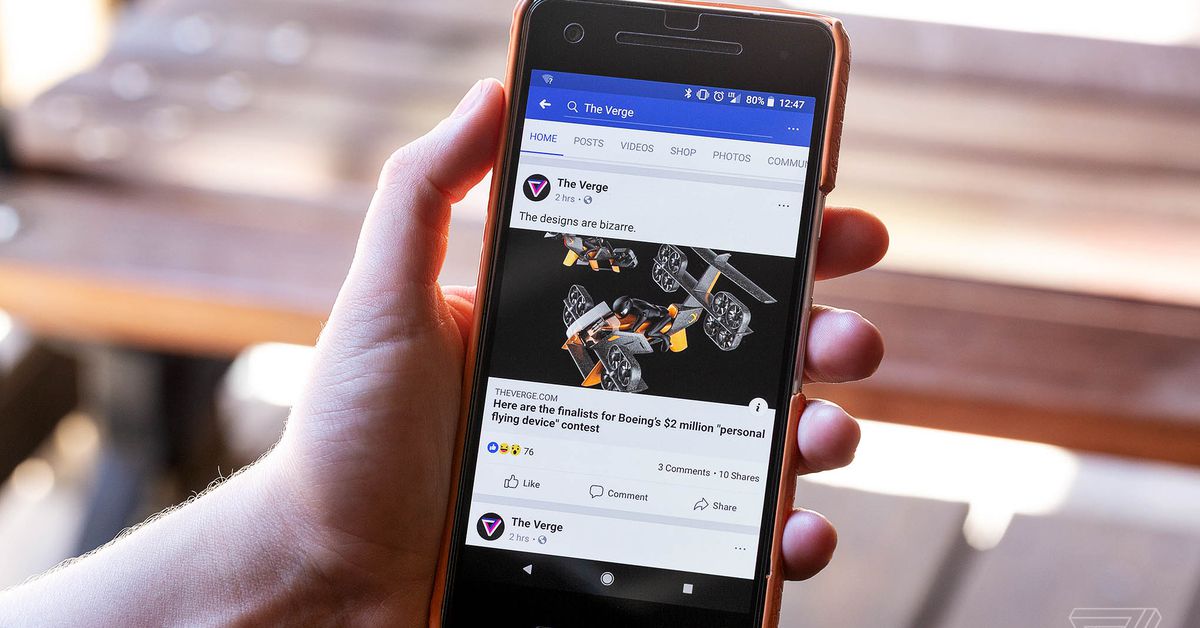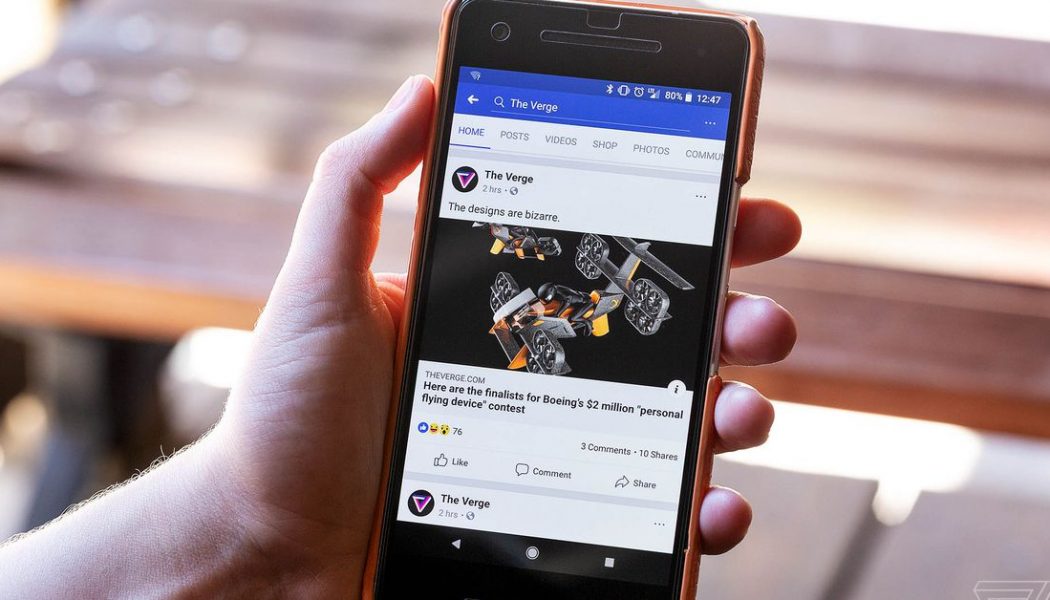
Today, let’s talk about a couple little things that could turn into a big thing.
In January 2019, Mike Isaac reported a noteworthy development about Facebook at the New York Times. In the months to come, he said, Facebook would unify the technical infrastructure powering Facebook, Instagram, and WhatsApp. To the user, these changes would be invisible. But to Facebook itself, there were clear strategic imperatives to merge the apps. Among them: the move came just as the US government was beginning to consider an effort to break the company up.
In the nearly two years since, the government’s effort has accelerated. On September 15th, the Wall Street Journal reported that an antitrust case against the company could come by the end of the year. But Facebook’s effort to puree its family of apps into a single software smoothie on the back end has picked up as well. And there have been two significant developments on that front this week.
One, Facebook is now testing a unified “accounts center” that shows you which of its apps you’re logged into. As Ashley Carman points out at The Verge, this will allow you to add a credit card in one place and be able to use it wherever you use Facebook apps:
The new hub serves two purposes. One, it’ll benefit prolific posters, like brands and influencers who want to post the same content across their social profiles. They can now do so automatically and within Facebook. Second, saving payment information makes it easier for people to shop on Facebook and Instagram. Adding a credit card to either service is a small hurdle, but still, it’s a barrier to buying a product. With Facebook Pay syncing, people can get straight to buying regardless of the platform on which they see the ad.
Two, and of arguably greater interest, the company announced today a test of cross-platform messaging between Facebook and Instagram. Here’s James Vincent at The Verge:
Facebook has taken its biggest step yet in integrating its various messaging platforms, allowing select users on Messenger and Instagram to message one another app to app. In addition to the launch of cross-platform messaging, Instagram is also getting a major overhaul of its DM system, which will be expanded with features taken from Messenger.
New Instagram messaging tools include vanishing messages, selfie stickers, custom emoji, chat colors, new ways to block unwanted messages, and the introduction of Messenger’s Watch Together feature, which lets you watch videos with friends during a video call.
Everywhere you look, Facebook and Instagram are becoming just a little bit more the same. (Another Verge headline, from early September: “New test lets some people view Instagram stories directly through Facebook.” And none of it can be said to be a surprise: we have known about it since January of last year.
At that time, I suggested that one benefit of this approach would be to make a potential break-up of the company more difficult. “If the Federal Trade Commission ever planned to compel Facebook to spin out WhatsApp and Instagram,” I wrote, “you can imagine the company explaining that there was no longer such a thing as ‘WhatsApp’ or ‘Instagram.’ Going forward, those names will refer only to their respective graphical user interfaces. Behind the curtain, there is only Facebook.”
Shira Ovide picks up this thread in her newsletter today. “What’s happening now shows the difficulty of checking the power of superstar companies like Facebook, Google and Amazon,” she writes. “By the time the impact of small changes they make becomes obvious, it might be too late to do anything about it.”
Of course, if you approach the question of unifying Facebook’s apps from the standpoint of a user, rather than a regulator, there’s plenty to like here. A lot of people use both Facebook and Instagram, and if you send a lot of messages in Instagram, you might enjoy having a bunch of Messenger features at your disposal.
“What we’re trying to do is figure out how we can offer the most compelling service we can, that creates the most value for people, because we see it as core to our reason to exist,” Instagram chief Adam Mosseri told me in a Messenger video chat last week.
Leaning on Messenger allows Instagram to add a variety of what the company calls “finally” features to Instagram’s direct messages — letting you reply to individual messages rather than only the most recent one for example, or letting you forward messages. They’re called “finally” features because they seem obvious to outsiders, and are usually described that way in headlines when they appear. And because Facebook owns multiple messaging apps, it can just build them once and deploy them everywhere, with minor modifications, rather than endlessly duplicate that work.
Of course, monopolistic practices are often useful and convenient. It was useful and convenient for Microsoft to bundle a browser with Windows — it was just also illegal, according to the government at the time. And so added convenience won’t be enough to throw the Federal Trade Commission off the case, and may in fact actually ratchet up the pressure on Facebook.
Mosseri offered two responses to competition concerns. The first, and possibly more mundane, is simple operating efficiency. It’s cheaper to build something once than to build it twice. “Especially on the Instagram side, which is a smaller team, we are constantly looking for leverage,” Mosseri said, “and how can we get something that we want done by leveraging people or technology somewhere else in the company.”
The second reason he offered is that that Facebook does not have a dominant position among messaging apps in many countries, including the United States. The moves announced this week are necessary to help Facebook compete in the messaging market, he said. Framed this way, Facebook’s moves aren’t about consolidating control over social networks — they’re about trying to gain ground against even larger tech companies.
“We are playing from behind in an area that is core to our mission,” Mosseri said. “And so it would be crazy not to do everything we can to make the the messaging services we offer as compelling as possible. It would just be silly not to bring over features that we know people love in one experience to the other experience.”
Instagram is at a competitive disadvantage to iMessage given that it’s part of iOS, Mosseri said.
“iMessage is installed by default, it has notifications on by default, and I’m sure Apple will continue to invest in it,” he said. “Because it’s super strategically important — it makes it way more difficult to switch to Android, right? Because no one wants to be the green bubble guy, and all your group chats break.”
Of course, take this argument a little further and you could ask why Instagram should continue to exist at all. Is its long term-future simply as an alternate interface for Facebook?
“In areas where consolidating practices create more value for people we’re going to do that,” Mosseri said, citing the creation of a centralized platform integrity team for the whole company as an example. “But there are other areas where we’re gonna differentiate. Instagram is really focused on this idea of emerging culture. … And so we’re going to be more focused on things like Reels, and creator tools, and creative tools. Stories, relative to [the core] feed, will be a higher priority. So there’ll be a lot of differences.”
For his part, Mosseri said the moves are borne out of necessity.
“That’s really the primary reason — we’re trying to compete,” he said. “And I think that’s good. You want companies trying to come up with more compelling offerings, because they’re competing with each other, and then let people have choice.”
If the government does attempt to force a breakup of Facebook, consumers might someday have even more choice. But after this week’s moves, any such action would seem to be much more difficult. And I do believe that’s by design.
Pushback
Yesterday I wrote about Coinbase’s attempt to ban politics as an act of wishful thinking. Reader Tyler Hogan responded with a really sharp comment, which he gave me permission to share here:
This goes further than “managerial class wants to remind plebs who’s in power.” Note the citations of Facebook and Google walkouts, written in such a way to assume that these aforementioned employee revolts were the cause of discontent and subsequent lack of productivity within each company. How about systemic cultural racism within companies dampening work energy? Dismay at poorly behaved executives getting payouts while normal employees get nothing? Blatant dual-class approach to management? Armstrong falls victim to a classic managerial class practice of misaligning cause and effect: seeing the symptom and assuming it’s the problem.
Governing
⭐ Tuesday’s Debate Made Clear the Gravest Threat to the Election: The President Himself. The headline to David E. Sanger’s analysis in the New York Times really says it all, but I think it’s important for us all to grapple with. Donald Trump is not a problem that platforms can solve, but they do need to have a plan for him. Multiple plans, really. Sanger writes:
His unwillingness to say he would abide by the result, and his disinformation campaign about the integrity of the American electoral system, went beyond anything President Vladimir V. Putin could have imagined. All Mr. Putin has to do now is amplify the president’s message, which the Russian leader has already begun to do.
Everything Mr. Trump said in his face-off with Joseph Biden Jr. he had already delivered in recent weeks, in tweets and rallies with his faithful. But he had never before put it all together in front of such a large audience as he did Tuesday night.
⭐ The US Justice Department is asking state attorneys general to sign onto a lawsuit against Google, expected to come as soon as next week. The case is expected to focus on Google’s dominance in search.
The Justice Department has also been investigating Google’s “search advertising,” the ads that appear under a search box if a person looks up a consumer item like “dishwasher.” Google controls the sale of the space under these searches, as well as the tools to make those ad sales.[…]
Regarding search, Google has said users have access to other information sources, like Twitter for news and Amazon for products. In advertising, it says it competes with a large array of companies, including Oracle and Verizon.
President Trump refused to condemn right-wing extremist groups when asked during the first presidential debate. “Who would you like me to condemn? The Proud Boys? Stand back and stand by,” he said. (Hanna Trudo, Will Sommer and Spencer Ackerman / Daily Beast)
TikTok said it would remove videos falsely suggesting that Joe Biden wore an earpiece during the debate. Videos and Trump ads with the misinformation received more than 700,000 views. (Elizabeth Dwoskin / Washington Post)
Joe Biden’s campaign is releasing a new Snapchat lens encouraging supporters to vote early in key swing states ahead of the US presidential election. The Biden team will be the first campaign to employ Snapchat’s Marker technology. (Makena Kelly / The Verge)
Big Tech companies could be banned from giving their own services preferential treatment in search rankings, or exclusively pre-installing their own apps on devices, under new regulations planned by the European Union. The initiative comes as competitors of Apple and Google increasingly rely on the platforms to offer their own services. (Natalia Drozdiak / Bloomberg)
A Project Veritas video that went viral on Facebook, YouTube, and Twitter was probably part of a coordinated disinformation effort, according to researchers at Stanford University and the University of Washington. The video contained unfounded claims of ballot stuffing. It was tweeted multiple times by Donald Trump Jr., whom researchers said likely knew about the video in advance. (Maggie Astor / The New York Times)
Industry
⭐ Coinbase is offering employees four to six months in severance pay to leave if they disagree with CEO Brian Armstrong’s mission to keep politics out of the workplace. The news comes after Armstrong published a blog post explaining his position, which subsequently blew up on Twitter. Here’s Frank Chaparro at The Block:
Coinbase CEO Brian Armstrong, who penned the controversial blog outlining why the exchange will mainly focus on its crypto mission versus social activism, said that it would provide employees with a package to leave the firm if they don’t “feel comfortable with the new direction,” according to an internal company email reviewed by The Block.
In the blog post released Sunday, Armstrong explained why the firm should be “laser focused” on its mission to build an open financial system while focusing “minimally” on broader societal issues and political causes. The message was met with a cacophony of both support and opposition from the crypto world and beyond. Some praised the former Airbnb engineer for attempting to cultivate an ideologically inclusive environment. Others argued that the tone of the piece was cold and out of touch.
A Clubhouse conversation about antisemitism in the Black community left some users feeling the event had reinforced racist stereotypes. Clubhouse has made efforts to increase its moderation efforts, but the news implies it might not have gone far enough. (Zoe Schiffer / The Verge)
Twitter is rolling out voice tweets to more iOS users. The feature lets you record a snippet of audio to include with a tweet. In response to criticism, the company is also plans to add transcriptions to improve accessibility. I got access to this feature months ago, used it once, and then never again. I haven’t see anyone else use it, either. Strange. (Jay Peters / The Verge)
TikTok has 17 million users in Britain spending over an hour a day on the app. A marketing presentation from the company shows the app has built a local following almost half as large as Facebook’s in just three years. (Chris Stokel-Walker / Bloomberg)
And finally…
Chris Wallace’s debate performance tonight is a great reminder that kindergarten teachers are underpaid. #Debates2020
— The Daily Show (@TheDailyShow) September 30, 2020
That debate was the worst thing I’ve ever seen & I was in The Star Wars Holiday Special.
— Mark Hamill (@HamillHimself) September 30, 2020
That was the worst thing I’ve ever seen, and I wrote FANTASTIC FOUR.
— Jeremy Slater (@jerslater) September 30, 2020
here at the dole banana company, we’re not interested in politics. we’re just interested in growing great bananas.
— jason b. prado (@jasonpjason) September 28, 2020
Virtual meetings are basically modern seances.
“Elizabeth are you here?”
“Make a sound if you can hear us.”
“Is anyone else with you?”
“We can’t see you, can you hear us?”
— Lana Del Gay ️ ✨ (@McClellandShane) September 23, 2020
Talk to us
Send us tips, comments, questions, and more Facebook integrations: casey@theverge.com and zoe@theverge.com.










